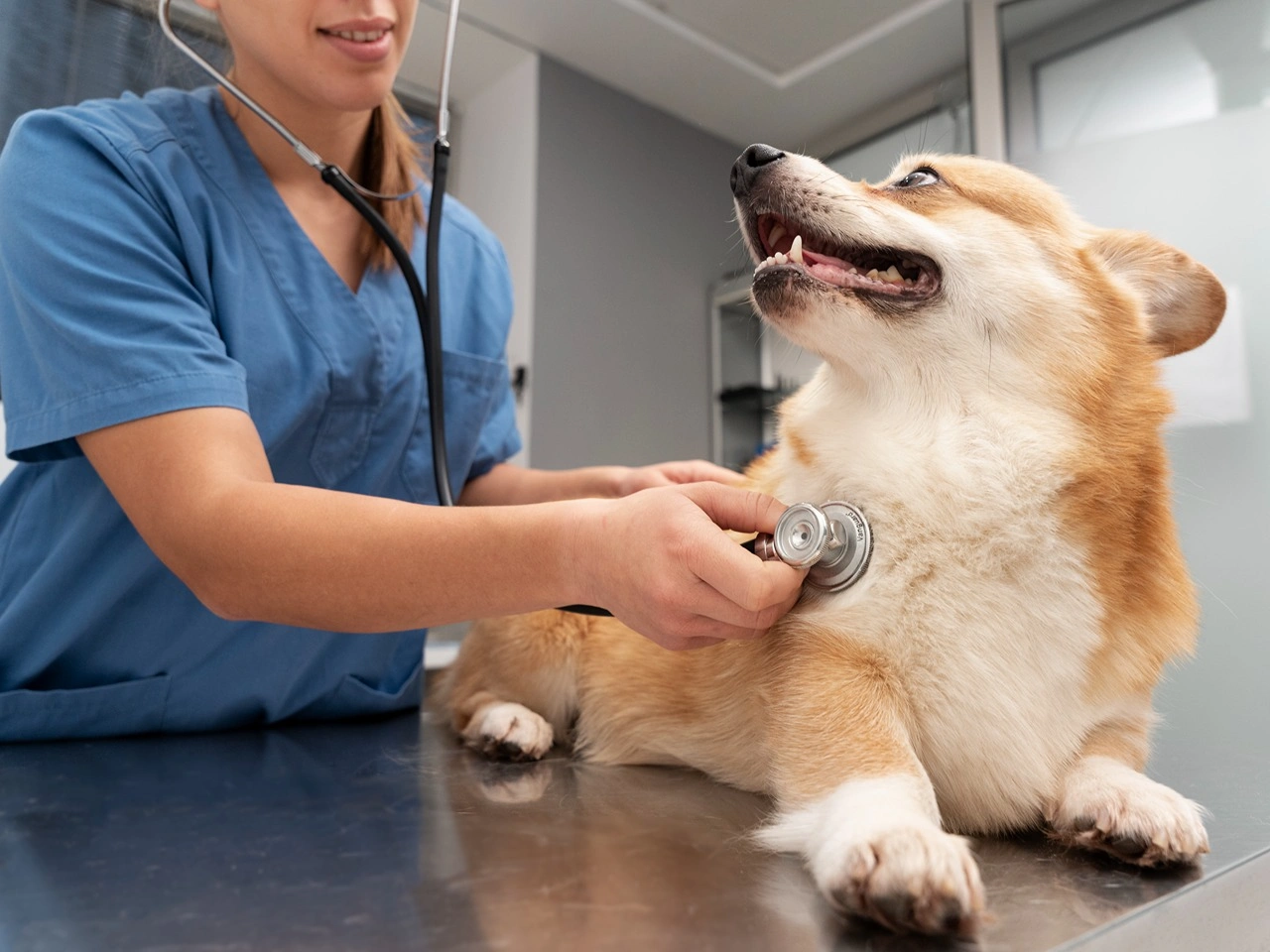TL;DR — Heartworm Tests in Pets
- Heartworm disease is a serious, mosquito-borne illness affecting dogs and sometimes, even cats..
- Annual heartworm testing detects infection early, even before symptoms appear.
- Antigen and antibody blood tests identify adult heartworms or the pet’s immune response.
- Dogs are the most common hosts, while cats can suffer severe effects from just one worm and must rely on prevention since treatment isn’t safe.
- Yearly testing is essential, even for pets on monthly heartworm prevention.
- Preventive medications kill heartworm larvae before they mature into harmful adult worms.
- Treatment of heartworm infection is complex and multifaceted. Always consult with your DVM to discuss treatment options.
- Early testing and consistent prevention help protect pets from deadly heartworm disease.
Need guidance? Consult us, our vets can recommend the best prevention plan for your pet’s lifestyle.
How do you detect a heartworm infection before it becomes life-threatening? Heartworm disease is caused by microscopic larvae transmitted by mosquitoes. Over several months, these larvae mature into adult worms that live in the heart, lungs, and blood vessels. Left untreated, they cause severe - and often fatal - damage. A heartworm antigen test uses a blood sample to detect heartworm proteins from adult female heartworms.
A heartworm test is a simple blood test that detects proteins released by adult female heartworms. Because it can take six months after infection for worms to be detectable, annual testing is critical, even for pets on monthly prevention. A positive result confirms infection and requires veterinary care. A negative result doesn’t always rule out early infection, which is why repeated yearly testing is recommended.
Heartworm disease is harder to detect in cats, where even a single worm can cause serious illness. Cats often develop respiratory signs, which are sometimes mistaken for asthma. Read on to learn how heartworm tests work, what they reveal, and why they are crucial for preventing heartworm disease.
What Is Heartworm and How Does It Affect Pets?

Heartworm is a parasitic worm that can infect dogs and cats through mosquito bites. Once inside the body, the parasite goes through multiple stages of the heartworm parasite before it matures into adult worms that live in the heart and lungs. The presence of heartworm can lead to serious complications, especially if left undetected.
Heartworm Infection and Its Life Cycle
The heartworm life cycle begins when a pet becomes infected with heartworms after being bitten by an infected mosquito. The larvae enter the bloodstream and eventually mature into adult worms over several months. These adult worms can interfere with normal blood flow and organ function.
Effects on Pet Health
Heartworm disease is a serious condition that can cause lasting damage to the heart, lungs, and arteries. The severity of the disease depends on the number of worms, the duration of infection, and the pet's immune response. All pets are susceptible to heartworm infection, even with only a few worms present.
Signs and Diagnosis of Heartworm in Pets

Heartworm doesn’t always shout; it whispers at first. That’s why spotting early signs and getting the right diagnosis can make all the difference. Here’s how heartworm shows up differently in dogs and cats—and what vets look for to confirm it.
In Dogs: The Classic Victim
Dogs are the prime target for heartworms, and over time, the symptoms get louder as the worms grow and multiply:
- Persistent cough that worsens with activity
- Tiring quickly, even on short walks
- Weight loss and lack of appetite
- Swollen belly from fluid buildup (in severe cases)
Diagnosis:
- Lab tests: Antigen test detects adult female worms
- Microfilaria test checks for baby worms in the bloodstream
- Chest X-rays or ultrasound help visualize heart and lung damage
- Vets recommend annual testing, even for dogs on prevention
Special Considerations for Rescue Dogs:
Dogs rescued from southern regions (for example, post-Katrina rescues) should be tested for heartworm upon arrival and retested 6–7 months later to confirm negative results. During this period, they should be on heartworm prevention to protect against infection. This ensures early detection and reduces the risk of serious illness.
In Cats: Subtle but Serious
Cats are an unusual host, so they often don’t carry many worms—but even one can cause major issues.
- Coughing and wheezing, often mistaken for asthma
- Sudden vomiting, not linked to food
- Collapse or seizures, sometimes without warning
- Sudden death, even without visible symptoms
- Antibody tests detect exposure to heartworms
- Chest X-rays and echocardiograms are crucial for visual diagnosis
Diagnosing cats is tricky. Vets often need to piece together multiple signs and tests.
What Is a Heartworm Test and How Does It Work?

A heartworm test is a blood test used to detect the presence of heartworm in pets before obvious clinical signs appear. It plays a vital role in the early detection and management of heartworm disease, especially in animals that may have existing heartworm without visible symptoms.
What Does a Heartworm Test Check?
A heartworm test identifies:
- The presence of adult female heartworms through antigen and antibody tests
- Early immune responses in animals like cats help detect heartworms in cats
This is essential because heartworm disease is a serious condition that can progress even before symptoms develop.
How the Heartworm Test Works
- Blood Test Sample: A veterinarian collects a small blood test sample from the pet.
- Antigen and Antibody Tests: The sample is checked for substances that show the presence of adult female heartworms or the pet's immune response.
- Detection of Infection: A positive result confirms an existing heartworm infection. A negative result may mean the pet hasn’t been infected, or it’s too early in the life cycle to detect (before the worms mature into adult heartworms).
- Timing Matters: Since it takes about six months for larvae to mature into adult heartworms, testing too early may not reveal infection. This is why yearly testing is strongly recommended.
Why Testing Is Critical
- Dogs are the natural host for heartworms and are highly susceptible.
- Heartworm infection in cats can occur even without many adult worms and may lead to sudden clinical issues.
- For rescue animals arriving from southern regions where heartworm is more common, veterinarians recommend testing upon arrival and re-testing 6–7 months later. These pets should also remain on heartworm prevention during this time, as early infections may not be detectable right away.
Role in Prevention
Even with regular use of medication to prevent heartworm infection, annual testing is needed to ensure there is no existing heartworm that could require action. Detecting the presence of heartworm early helps vets act quickly to treat heartworm and kill adult heartworms if needed.
Why Heartworm Tests Matter for Early Detection and Prevention

Annual heartworm testing plays a crucial role in detecting existing heartworm before symptoms appear and is key to preventing heartworm disease in pets.
Detecting the Presence of Heartworm
Testing identifies the presence of adult female heartworms before clinical signs develop.
- Antigen and antibody tests are used to detect heartworm infection, especially in dogs and cats.
- These blood tests help confirm if the pet is infected with heartworms even before symptoms start.
- The diagnosis of heartworm allows treatment to begin before the severity of the disease increases.
Preventing Heartworm Infection Through Early Action
Testing supports timely decisions in heartworm prevention strategies.
- Knowing a pet’s heartworm status ensures safe administration of preventives.
- Pets already infected with heartworms should not receive some preventives until treatment for heartworm infection begins.
- Annual testing is part of heartworm education efforts to reduce the incidence of heartworm.
Monitoring Treatment and Disease Progression
Testing also helps track the stages of the heartworm parasite and guide treatment plans.
- Blood tests measure the effectiveness of medications used to kill adult heartworms.
- Re-testing ensures the existing heartworm load is eliminated.
- In cats, testing helps monitor changes in the presence of heartworm, where treatment options are limited.
Supporting Long-Term Heartworm Disease Control
Regular testing contributes to controlling the spread and impact of heartworm.
- Early detection reduces complications from advanced heartworm disease.
- It supports the prevention of heartworm disease across communities by lowering undiagnosed cases.
- Continued testing reduces risks even in pets that appear healthy but may have mature heartworms.
How Heartworm Preventive Medications Help Stop Infection

Heartworm preventive medications are essential in stopping the development of the heartworm parasite before it can cause serious disease in pets.
Interrupting the Life Cycle of the Heartworm Parasite
Preventive medications target the early stages of infection before adult heartworms can develop.
- Most preventives kill the larval stage (L3 and L4) of the heartworm parasite transmitted by mosquito bites.
- When given monthly, they eliminate these immature worms before they reach the heart and lungs.
- This stops heartworm disease from ever taking hold in the pet’s system.
Easy and Effective Protection With Regular Use
Heartworm preventives are designed for consistent use to keep pets protected year-round.
- Options include oral tablets, topical treatments, and long-acting injections.
- Administering preventives on schedule is critical to avoid gaps in protection.
- These medications are available for dogs and cats as a form of routine health care.
Role in Reducing the Need for Heartworm Treatment
Prevention significantly lowers the chances of needing complex treatment for heartworm.
- Treatment for heartworm disease is lengthy, expensive, and can involve serious risks.
- Preventives reduce the overall number of infected pets and decrease the spread of the disease.
- By using preventives, pet owners can avoid the distress and health threats linked to advanced heartworm disease.
Recommended as Part of Veterinary Heartworm Prevention Plans
Veterinarians stress the importance of preventives as the first defense against heartworm.
- Preventives are most effective when combined with yearly heartworm tests.
- They are recommended even for indoor pets, as mosquitoes can still pose a threat.
- Heartworm prevention is tailored to each pet’s lifestyle, species, and regional risk.
Treatment for Heartworm: What to Expect After a Positive Test

When a pet tests positive for heartworm, it marks the beginning of a structured treatment plan to eliminate the parasites and support the animal’s recovery. Heartworm treatment, especially for dogs, is a multi-step process that requires strict care, professional veterinary supervision, and time.
Confirming the Diagnosis With Additional Testing
A single positive test result doesn’t immediately lead to treatment; it must first be confirmed and assessed for severity.
- Veterinarians often perform further diagnostics, such as antigen tests, microfilaria tests, chest X-rays, and echocardiograms.
- These tools help determine how many worms are present, how long the pet has been infected, and whether the heart or lungs have been affected.
- In canine heartworm cases, this stage is called "disease staging" and is vital for selecting the safest and most effective treatment protocol.
- For cats, diagnosis is more complicated, and imaging is often essential since heartworms can be present without producing antigens.
Starting Pre-Treatment and Activity Restriction
Before targeting adult worms, pets are stabilized and given medications to reduce inflammation and bacterial risks.
- Dogs are typically prescribed doxycycline to kill Wolbachia, a bacterium that lives inside heartworms and contributes to disease symptoms.
- Anti-inflammatory steroids, such as prednisone, may also be administered to reduce lung and vessel inflammation.
- Activity restriction is enforced during this period and continues throughout treatment—exercise can increase the risk of blood clots as the worms begin to die.
Administering Adulticide Injections to Kill Heartworms
The core of the treatment for heartworm disease involves injections of a drug that kills adult worms.
- The medication melarsomine dihydrochloride (Immiticide) is injected deep into the lumbar muscles, often in a 3-dose protocol over a month.
- This kills the adult heartworms in stages to reduce the risk of lung damage from dying parasites.
- Pets must be monitored closely for side effects, such as coughing, depression, poor appetite, or pain at the injection site.
Ongoing Monitoring and Recovery After Treatment
Recovery from heartworm disease doesn’t end with the final injection—follow-up care is essential to ensure success.
- Pets must continue to rest and avoid strenuous activity for at least 6–8 weeks after treatment to prevent embolisms or complications.
- A heartworm test is performed six months post-treatment to confirm the absence of adult worms.
- Preventive heartworm medication is resumed or continued to stop future infections, as reinfection is always a risk if prevention lapses.
Final Thoughts
Heartworm tests are your pet’s best defense against a silent but deadly threat. These quick and simple blood tests catch infections early, before symptoms even start.
Even if your pet is on preventives, annual testing ensures nothing slips through the cracks. A clear test means peace of mind, while a positive one means you can act fast.
Regular testing keeps tails wagging and purrs going strong. Contact us if your pet’s due for a heartworm test or if you’re just wondering how one tiny blood sample could be the lifesaver they never knew they needed.
Frequently Asked Questions
What is the purpose of a heartworm test for pets?
A heartworm test is vital because it helps detect the presence of heartworms before symptoms appear and complications arise. Consider:
Early detection advantage: Heartworm tests identify the presence of heartworm antigens in the bloodstream, often before your pet shows signs of illness.
Monitoring treatment success: Routine testing ensures that your pet’s preventive medication is effective and that no breakthrough infection has occurred.
Protects against severe outcomes: Detecting heartworms early allows for prompt treatment, which can reduce the risk of heart failure and organ damage.
Annual necessity: Most veterinarians recommend testing every 12 months, even if your pet is on year-round prevention.
What are the typical signs of heartworm disease in dogs?
Heartworm disease often develops silently, with symptoms emerging only after substantial damage has occurred. Consider:
Mild signs at first: Dogs may show a soft, persistent cough or tiring easily after light exercise.
Worsening symptoms: As the disease progresses, signs include difficulty breathing, weight loss, fatigue, and a swollen belly from fluid buildup.
Advanced disease impact: In severe cases, dogs may experience collapse, heart failure, or sudden death due to blocked blood flow.
Variable onset: Some dogs may show no symptoms at all until the disease reaches a critical stage.
Are indoor cats still at risk for heartworm infection?
Indoor cats remain at risk for heartworm because mosquitoes, the disease carriers, can easily get inside homes. Consider:
Transmission through mosquitoes: Even a single mosquito bite can transmit heartworm larvae to a cat.
Low worm burden, high danger: Cats may develop severe illness from just one or two worms, unlike dogs, which often carry more.
No safe treatment options: There is no approved treatment for heartworm disease in cats, making prevention the only safe strategy.
Common indoor exposure: Mosquitoes can enter through screens, doors, or small openings, putting indoor cats at continuous risk.
When should heartworm preventive medication be started?
Heartworm prevention should begin early in life and be maintained consistently to protect against infection. Consider:
Early age start: Most puppies and kittens can start on preventive medication at 6 to 8 weeks old, as recommended by a veterinarian.
Year-round necessity: Because mosquito exposure can happen in any season, continuous year-round prevention is advised.
Prevention before exposure: Pets should be tested for heartworm before starting or restarting medication, especially if there's been a lapse.
Various options available: Preventives come in oral, topical, or injectable forms to suit different pet needs and lifestyles.
How does heartworm disease in cats differ from dogs?
Heartworm disease in cats is particularly risky because their bodies respond differently to infection than dogs. Consider:
Severe effects from a few worms: Cats can suffer serious or even fatal complications from just one or two adult heartworms.
Non-specific symptoms: Signs often resemble other illnesses, such as coughing, vomiting, or asthma-like breathing, making diagnosis challenging.
No approved treatment: Unlike dogs, there is no approved heartworm treatment for cats, so prevention is essential.
Different immune response: Cats’ immune systems may react strongly to the worms, sometimes causing sudden death even with a low worm burden.




